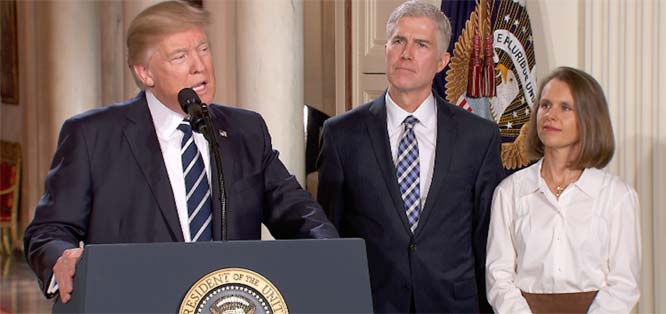
But Barnett made another point that's worth thinking about here: What if right-leaning jurists listened to their critics on the left, and adopted a "living Constitution" approach instead of relying on what the Framers understood the text to mean? As Barnett asks: "Why would you possibly want a nonoriginalist 'living constitutionalist' conservative judge or justice who can bend the meaning of the text to make it evolve to conform to conservative political principles and ends? However much you disagree with it, wouldn't you rather a conservative justice consider himself constrained by the text of the Constitution like, say, the Emoluments Clause?"
This got me thinking. According to that early living constitutionalist, Justice Oliver Wendell Holmes, the life of the law has not been logic, but experience. So what would a "living Constitution" approach from the right, based less on logic than experience, look like?
I immediately thought of one example from a few years ago: Judge Richard Posner published a book titled Not A Suicide Pact: The Constitution in a Time of National Emergency. Posner's approach was based on the notion that the post-9/11 War On Terror was a fundamentally different sort of problem, and that the constitutional civil liberties doctrines developed by judges throughout the 20th Century weren't suitable for this new world. In fact, when I interviewed Posner about his book, the idea that it was a "living Constitution" approach to the problem of terrorism and civil liberties came up in the interview.
Where else might we see changes? Well, I'm neither a conservative (I'm a libertarian) or a living constitutionalist, but I can imagine a few places.
One is in the scope of government power.
During the New Deal era, the Supreme Court - after being threatened with "court packing" by FDR - endorsed a massive expansion of governmental power on the ground that it would lead to greater efficiency in the economy.
Instead, we got a bloated bureaucracy with serious accountability problems, and a disastrous expansion in spending, regulation and federal debt. Based on this experience, I can imagine a conservative justice who sees the Constitution as a "living breathing organism" that must be kept in tune with the needs of the day deciding that the New Deal Court's decisions were mistakes that violate the Constitution, and must now be rolled back.
Likewise for the Warren Court's "one man, one vote" rule for state legislative apportionment, in which states - unlike the federal government under the U.S. Constitution - were no longer allowed to have a house of their legislature apportioned by geography rather than population.
The result has been that states like California or Illinois, which is red almost everywhere but in the Chicago metropolitan area, are totally dominated by the large populations of urban centers.
Those states are also governed badly and suffer from considerable degrees of corruption and enormous debt. Perhaps experience turns out to show that the "one man one vote" approach was wrong, and that there was wisdom after all in the Framers' approach of not apportioning everything according to population.
A "living Constitution" changes with the times!
Lastly, what about the Warren Court's decisions on reproductive rights in Griswold v. Connecticut (striking down laws against birth control for married people), Eisenstadt v. Baird (doing the same for singles), and Roe v. Wade (finding a constitutional right to abortion)? These decisions were written against a background of hysteria about a "population explosion," but now the United States - like many other countries - faces not a population explosion but a baby bust, with birth rates too low to sustain population, or to produce enough workers to fund retirement programs for the elderly.
These decisions were also followed by a breakdown in family structures that continues to get worse. I can imagine a "living Constitution" conservative concluding that, whatever the logic of these decisions is, experience has shown them to be too flawed to survive.
All of these would be catastrophic for the left, and I'm sure I could come up with many more examples given time and space. Fortunately for the left, Judge Gorsuch appears to be devoted to interpreting the Constitution as it was understood by the Framers (in terms of its "original public meaning," to use the law professor definition), and not to embracing a living Constitution.
But my advice to those on the left attacking originalist approaches is this: Be careful what you ask for, because you won't like it if you get it.
Comment by clicking here.
Glenn Harlan Reynolds, a University of Tennessee law professor, is the author of The New School: How the Information Age Will Save American Education from Itself and is a columnist at USA TODAY.


 Contact The Editor
Contact The Editor
 Articles By This Author
Articles By This Author